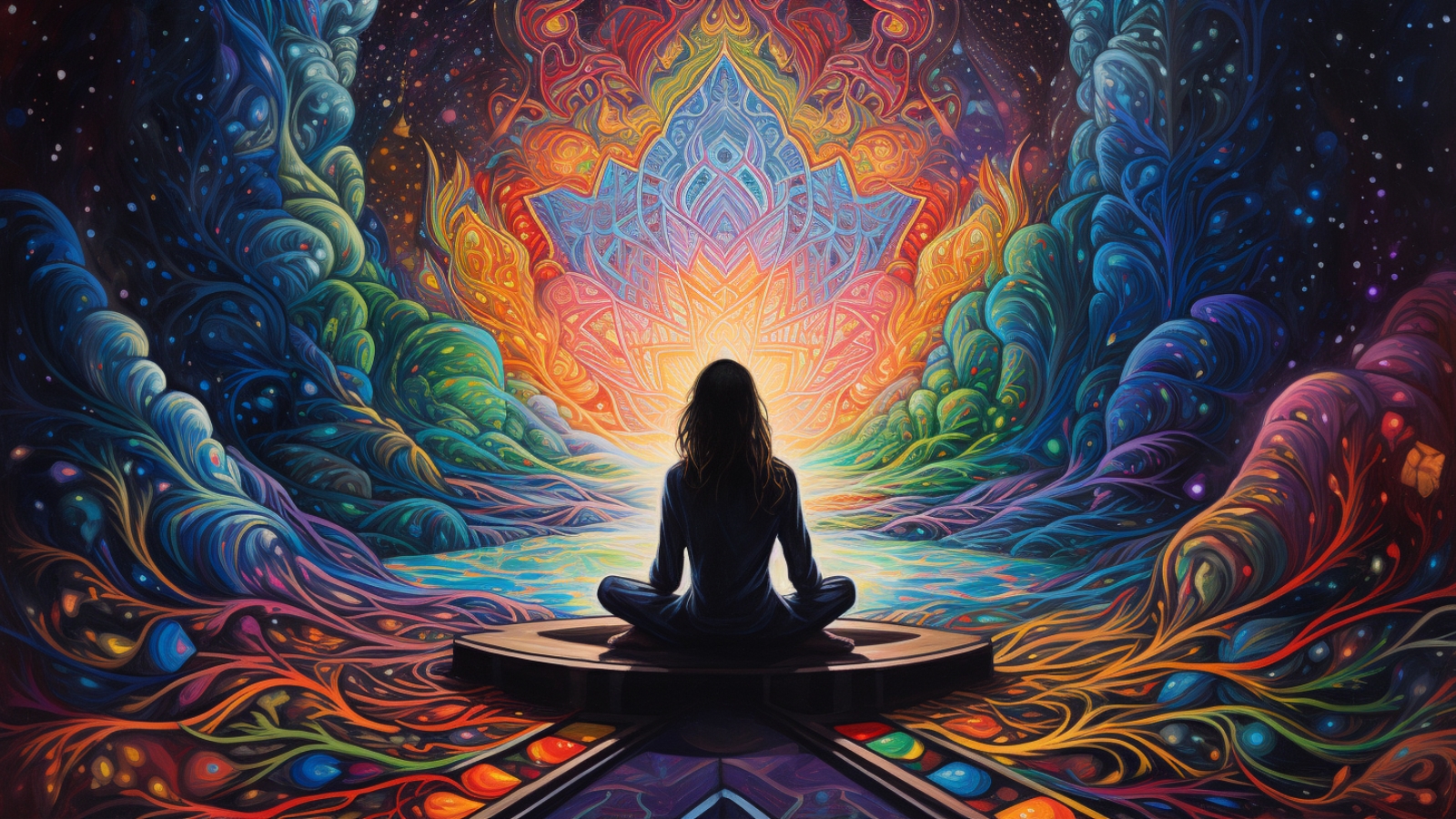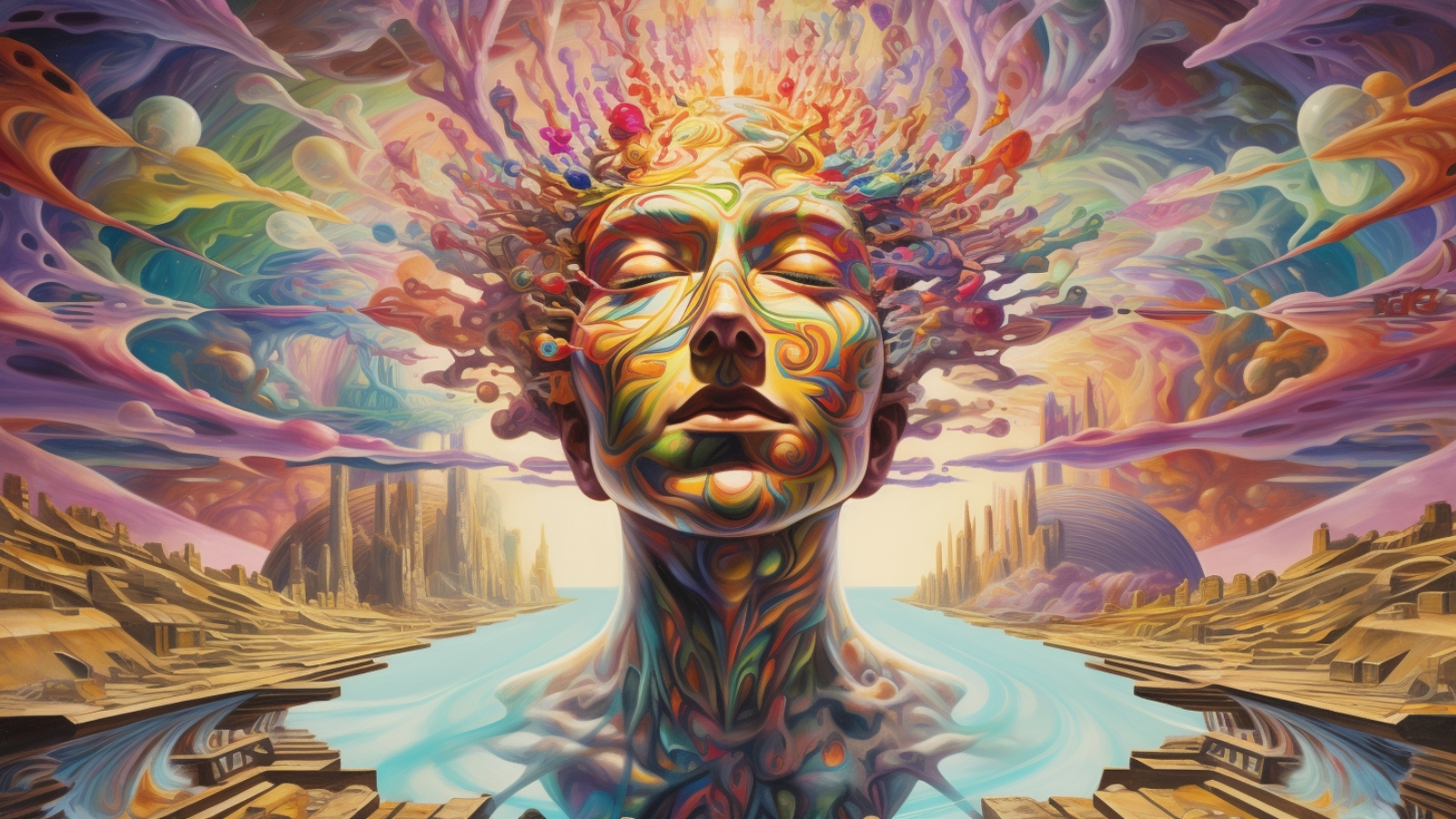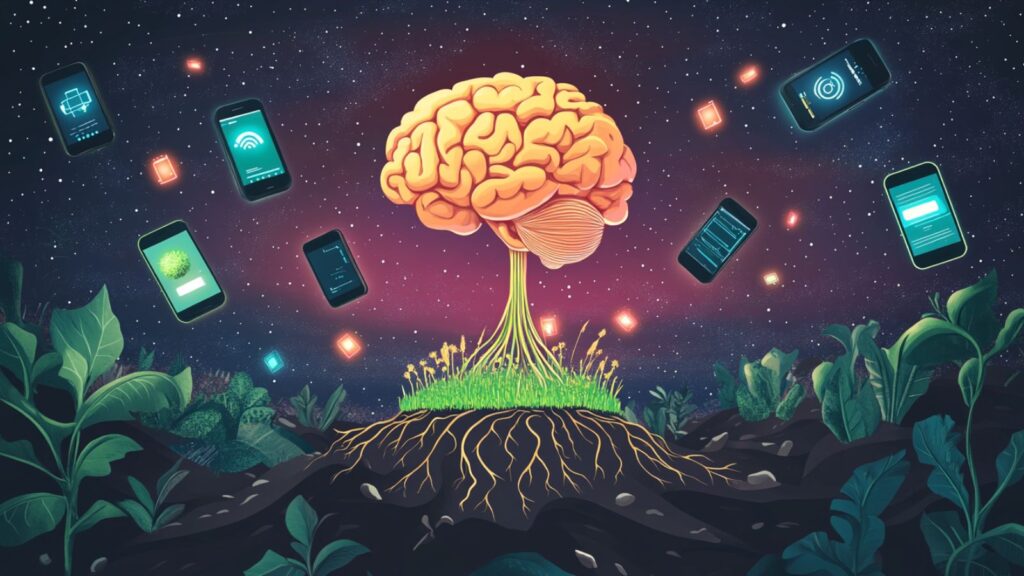Intention: To explore the transformative journey of ego death, examining its profound impact on our personal identity and the collective human experience.
Ego death is a metamorphosis. A transcendence from the ordinary. A place where the self dissolves and a new perception of reality emerges. The dissolution of the ego unravels the threads of conditioned identity, unveiling a fresh canvas upon which to explore and redefine one’s existence.
For many, ego death marks a rebirth—a sense of shedding limitations and embracing a more expansive, interconnected worldview. But what exactly is an ego death? How can one experience this phenomenon? And, can it exist outside of psychedelics?
What Is Ego?
The ego, often misunderstood as a fixed construct, is a dynamic force shaping our perception of reality. It serves as the inner architect, constructing our sense of self from a mosaic of experiences, beliefs, emotions, and societal influences.
At its core, the ego acts as a psychological mechanism fostering a sense of individuality. It delineates the boundaries between ‘me’ and the external world, spinning narratives and molding identities.
Seeking validation, it craves affirmation and recognition. While essential for survival, the ego’s function can also confine us within its rigid boundaries. It thrives on comparisons, perpetuating the divide between ‘self’ and ‘other.’ This incessant chatter often obscures the true nature of existence, clouding our desires, fears, and ambitions.
Peeling back the layers of the ego reveals its transient nature. It’s a malleable construct, shaped by experiences yet resilient, clinging to familiar patterns even in the face of transformation.
Understanding the ego’s influence marks the first step toward recognizing its limitations. It’s a guiding force, not the definitive truth of our essence. Ego dissolution isn’t about obliteration but transcendence—a liberation from the confines of a limited identity.
In essence, deciphering the ego is akin to unraveling a complex woven map of experiences, beliefs, and societal conditioning. It’s a multifaceted force, wielding immense influence over our perception of self and the world. Yet, it remains transient, open to transformation and transcendence.

What Is Ego Death?
Ego death, a concept that unravels the very fabric of selfhood, plunges individuals into a realm where the boundaries of ‘self’ blur and dissipate. This phenomenon, while profound, remains an enigma to many—an intricate dance on the edge of consciousness and existence.
At its core, ego death signifies more than a loss of identity. It’s the dissolution of the framework that separates ‘me’ from the world. Imagine standing on a precipice where the distinction between observer and observed fades into obscurity—a moment where the river of consciousness flows without a perceivable bystander on its banks.
This transcendence plummets into the depths of non-dualistic mindfulness, a concept championed by minds like Sam Harris. This concept focuses on trying to find the ‘self,’ and what happens when you’re unable to find it—the break that you experience when you realize that separation from yourself, bringing into question the very essence of the subject-object dichotomy.
The crux of this exploration challenges the entrenched belief in an ‘I’ at the center of experience. Who or what is experiencing my experience? Non-dualistic mindfulness suggests that every reference point for this ‘who’ or ‘what’ is merely a fragment of the experience itself. There’s no spectator standing outside the spectacle; there’s only the spectacle itself.
In the throes of ego death, the realization dawns that there isn’t someone observing consciousness and its contents. Instead, one embodies consciousness, intertwining seamlessly with its contents. The very sense of being an observer dissolves, revealing that experience doesn’t occur from some external vantage point but is intrinsic to one’s being.
Put concisely: You are not having an experience. You are identical to experience. You are not on the outside looking in.
This concept is a whirlwind, a conceptual rollercoaster that defies conventional understanding. It’s not a momentary lapse but a transformative journey, often glimpsed in fleeting moments of profound insight.
Ego death beckons individuals to transcend the confines of the ‘self,’ inviting them to relinquish the deeply ingrained belief in separateness. It’s an odyssey into the heart of consciousness, an unraveling of the threads that weave the tapestry of identity.
Ultimately, the ego can’t really die. Ego death isn’t a cessation but a transcendence—an invitation to perceive existence without the confines of the ‘I.’ It challenges the very essence of what it means to be, beckoning individuals to embrace a reality where the river of consciousness flows without the illusion of a spectator on its banks.
How Does Ego Death Happen?
Ego death arises from various catalysts. While its occurrence might seem elusive, it emerges through deliberate practices, altered states of consciousness, and profound moments of self-realization. Here are a few scenarios where an ego death may occur.
Contemplative Practices
Meditation and contemplative practices serve as gateways to ego dissolution. These practices encourage a deliberate exploration of consciousness, dismantling the fortress of the ego brick by brick. Through sustained mindfulness and introspection, individuals peel back the layers of self-perception, revealing the transient nature of the ego.
The Waking Up app is an incredible place to start. Here you’ll find guided meditations, reminders, and impactful insights that challenge perception, perspective, and the concept of mindfulness altogether.
Psychedelic Substances
Psychedelics, known for their ability to induce altered states of consciousness, often act as accelerators on the path to ego dissolution. Substances like psilocybin, LSD, or DMT can catalyze experiences where the ego seemingly dissolves, leading to a profound sense of interconnectedness and unity with the cosmos.
Intense Emotional States
Moments of extreme emotional intensity—be it intense joy, profound grief, or overwhelming awe—can trigger glimpses of ego dissolution. In these moments, the boundaries of the self soften, allowing individuals to transcend their usual cognitive boundaries and experience a deeper connection with the world.
Spiritual Awakening
Instances of spiritual awakening or enlightenment are often linked with ego death. These experiences are characterized by a fundamental shift in perception, where the ego’s dominance diminishes, and a profound sense of oneness with existence emerges.
Profound Realizations
Ego death can also manifest through moments of profound insight or realization, often triggered by philosophical contemplation, deep introspection, or encounters with transformative teachings. These instances prompt individuals to question the very nature of their existence, leading to a temporary dissolution of the self.
Near-Death Experiences
Remarkably, near-death experiences can also catalyze ego dissolution. In these moments, when faced with mortality, individuals often report a sense of detachment from the self, leading to a transformative shift in perception and priorities.

Stages of Ego Death
Depending on who you talk to, there could be anywhere from three to ten stages of ego death. However, most parties agree upon at least three distinct yet interconnected stages. While each journey through ego dissolution is unique, there are common threads that weave through these stages, shaping the fabric of the experience.
Dissolution
The journey toward ego death often commences with a phase of dissolution. This stage can be initiated by sustained meditation or the ingestion of psychedelic substances, leading to an altered state of consciousness.
In this realm, the boundaries of reality blur, and perceptions morph into kaleidoscopic imagery—sacred geometry and dreamlike visions often manifest. It’s a disorienting phase where one feels the ground beneath the feet of conventional reality slipping away.
The dissolution stage is marked by a palpable sense of losing grip on the known constructs of existence. It’s a disconcerting yet pivotal phase, initiating the unraveling of the ego’s grip on identity and fostering a glimpse into a reality beyond conventional understanding.
Ego Loss
As the dissolution phase culminates, individuals navigate through the threshold of ego loss. Here, the sense of subjective identity dissipates entirely. The concept of ‘self’ disintegrates, merging with the vast tapestry of reality. There’s no distinct ‘I’ to experience this state; instead, there’s an immersion into an expansive interconnectedness with the cosmos.
This phase might evoke sensations akin to a mystical experience—Nirvana or enlightenment. However, for the unprepared, it could prove profoundly disturbing, confronting the very fabric of their perceived reality.
Return to Everyday Life
Post-ego dissolution, individuals return to the mundane routines of everyday life, albeit with a transformed perspective. The echo of ego loss resonates, leaving an enduring impression on their consciousness. This altered perception can lead to both positive and negative outcomes, influencing mental well-being and outlook on life.
The experience of ego death lingers, shaping one’s understanding of self and reality for an extended period. It becomes a cornerstone of their existence, altering the lens through which they perceive the world.
What Does Ego Death Feel Like?
Ego death experiences are deeply personal and divergent. For some, shedding the cloak of identity feels akin to liberation and enlightenment—an unveiling of their true nature.
Conversely, others might grapple with the upheaval it causes to their mental well-being, perceiving it as a profound disruption. It may be wildly positive and euphoric or terrifyingly shocking.
For some, ego death can be an unsettling plunge into the depths of existential uncertainty. The dissolution of identity, the crumbling of the constructs that define ‘self,’ can evoke an overwhelming sense of disorientation and distress. The absence of a recognizable ‘I’ can feel like navigating uncharted waters without a compass—a daunting journey into the unknown.
This disintegration of the ego might manifest as a disruption at the very core of mental well-being, challenging the very pillars upon which one’s sense of reality stands. The experience can be jarring, confrontational, and profoundly unsettling to those unprepared for the upheaval it brings.
Beyond these diverging experiences lies a nuanced range of emotions—awe, fear, serenity, chaos—each woven into the fabric of ego death. It’s an encounter that transcends the confines of the ordinary, offering glimpses into the profound mysteries of consciousness.
Ultimately, ego death isn’t a uniform experience. Whether perceived as a gateway to enlightenment or a tumultuous disruption, its impact reverberates through the psyche, leaving an indelible mark that reshapes the very contours of one’s perception of self and reality.

Can You Experience Ego Death Without Psychedelics?
Ego dissolution isn’t confined to mind-altering substances. It transcends various paths, some steering clear of psychedelics’ influence. Meditation serves as a potent gateway, fostering introspection and mindfulness. Through disciplined practice, individuals unravel the layers of their ego, glimpsing moments of egolessness.
Deep introspection and philosophical inquiry can lead to ego death as well. By questioning the essence of ‘self’ and identity constructs, individuals traverse pathways toward profound insights and transcendence. Spiritual practices—devotion, prayer, or rituals—usher individuals into realms where the ego recedes, nurturing a heightened connection with the universe.
Intense emotions, like profound joy or overwhelming grief, can soften the rigidity of the ego, offering glimpses into a reality beyond the self. While psychedelics expedite this journey, alternative paths demand patience and dedication. These routes traverse the labyrinth of consciousness, unraveling layers of identity to embrace a reality surpassing individual confines.
Can Ego Death Cause Depersonalization?
Ego death can sometimes lead to a state known as depersonalization, where individuals feel detached from their thoughts, feelings, or even their own sense of identity.
During ego death, the dissolution of the self can be so profound that individuals might struggle to reintegrate into their usual sense of self. This disintegration can trigger feelings of detachment, as if observing oneself from a distance or feeling disconnected from one’s thoughts and emotions.
For some, this detachment is temporary and part of the transitional phase after ego dissolution. However, in some cases, it can persist, leading to prolonged depersonalization. This state might evoke feelings of unreality or disconnection from one’s own body, thoughts, or surroundings, creating a sense of detachment that can be distressing.
It’s essential to note that while ego death can be a catalyst for depersonalization, it’s not a guaranteed outcome for everyone. Factors such as an individual’s mental state, prior experiences, and their ability to integrate the ego dissolution experience into their life afterward play significant roles in determining whether depersonalization occurs and its duration.
Seeking guidance from mental health professionals or experienced practitioners post-ego death can aid in navigating these experiences and integrating them into one’s life in a healthy manner, mitigating the potential for prolonged depersonalization.
A Rebirth and New Perspectives
Experiencing ego death often leads to a profound transformation, prompting individuals to perceive themselves and the world through a different lens. It’s like shedding an old skin to reveal a new, more expansive understanding of self.
The dissolution of the ego strips away the layers of conditioned identity, allowing individuals to confront deeply ingrained beliefs and perceptions. This process can bring about a fundamental shift in how one perceives themselves and their place in the world.
While not a universal outcome, many individuals report feeling like a different version of themselves post-ego death. It’s as if they’ve undergone a metamorphosis, shedding limitations and embracing a broader, more interconnected perspective.
This experience often instills a sense of interconnectedness with the universe, fostering empathy, compassion, and an enhanced understanding of the human experience. Individuals may find themselves more attuned to the nuances of existence, more open-minded, and more willing to explore new paths.
However, the extent of this transformation varies from person to person. Some might undergo drastic changes in their outlook and behavior, while others might experience subtler shifts in their perception and approach to life.
Ultimately, ego death doesn’t guarantee a complete overhaul of one’s identity, but it can serve as a catalyst for profound personal growth and a reevaluation of one’s place in the tapestry of existence. It opens doors to new perspectives and potentials, inviting individuals to embrace an evolved version of themselves, one more aligned with their authentic essence.














